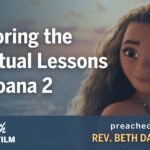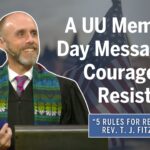The Christmas Story | Rev. Beth Dana | 12.17.23

In this homily, Rev. Beth Dana calls for empathy, understanding, and a commitment to peace during this Christmas season, drawing parallels between the divisions in the biblical land and the present-day conflicts.
Sermon Transcript
An Unplanned (and Symbolic) Space Use Conflict
This church was bustling yesterday in Children’s Ministries area and here in the sanctuary, there were dozens of children and adults preparing to act out the story of the first Christmas for us this morning. And throughout the rest of this building, were hundreds of people here for an Infant Care Resource Drive, sponsored by the Texas Equal Access Fund, serving families in need with free infant care products, self-care items for adults, and various holiday-themed activities and crafts and Santa made an appearance too. Both groups had planned to use the same space, and when we discovered the apparent conflict, there was some initial concern, but can you imagine a more perfect space conflict? A huge event serving families whose lives have been turned upside down by the arrival of a baby who need a little help and support. Next door, a bunch of children learning about and reenacting the story of Mary, a young mother whose surprise pregnancy brought about the most life-changing and world-changing arrival, the baby Jesus. She was vulnerable and depended on the kindness of strangers to find a room in which to give birth.
Everyone knew there was something special about this baby born a Jew in Palestine. Isn’t there something special about every baby? She did the best she could to care for Jesus as he grew in a world that was being torn apart by conflict, a world in which he was misunderstood and persecuted. When the angel Gabriel told her she was pregnant, he reassured her nothing will be impossible with God. There were many animals who welcomed the baby Jesus at his birth. Our congregation looks forward to the beloved sheep every year. We even have a sheep cam this year for you.
The Elephant in the Nativity
In my first nativity play in preschool, I was a camel. In the movie Love Actually, we learned that apparently there was a lobster present at the birth of Jesus, but this year there’s another animal, a huge one, an elephant. An elephant in the nativity and that elephant is the war in Israel and Palestine. The conflict in Israel and Palestine isn’t new. It raged long before Jesus’ life and remains long after. We don’t often talk about this conflict in the Christmas season because it’s complex and it’s hard to talk about, but the events that we are currently witnessing that are tearing apart the Middle East and tearing apart communities around the world have brought many to the point of emotional and spiritual crisis.
Breaking our hearts as we mourn the profound loss and destruction, the elephant in the nativity can’t hide in the shadows this year. We retell and reenact the story of the first Christmas every year because in hearing the words of scripture and watching the holy family, the angels, the sheep and shepherds, and the wise people, we find truths that speak to our lives and are reflected in our world today, and each year it resonates with us in a slightly different way.
The Contested History of Palestine
The land and the region called Palestine is probably one of the most contested pieces of land on earth. For hundreds of years prior to Jesus’ birth, most of the time it was divided into two kingdoms, Judah and Israel. Judah and Israel occupied different land but also grew into different cultures. Bethlehem, Jesus’s birthplace is in the area now known as the West Bank. There were some periods of unity, but then conflict would break out and it would divide again. Empire after empire invaded the region for thousands of years. Can you imagine the generational trauma carried by the land and its peoples?
One of the most commonly read pieces of scripture during this season of advent is a prophecy of unity from Isaiah in which he says this, “A shoot shall come out from the stump of Jesse, and a branch shall grow out of his roots. The spirit of the Lord shall rest on him. The spirit of wisdom and understanding the spirit of counsel and might the spirit of knowledge and the fear of the Lord. The wolf shall live with the lamb. The leopard shall lie down with the kid, the calf and the lion and the fatling together, and a little child shall lead them.
The cow and the bear shall graze, their young shall lie down together, and the lion shall eat straw like the ox. The nursing child shall play over the whole of the asp, and the weaned child shall put its hand on the adder’s den. They will not hurt or destroy on all my holy mountain for the earth will be full of the knowledge of the Lord as the waters cover the sea. On that day, the root of Jesse shall stand as a signal to the peoples. The nations shall inquire of him and his dwelling shall be glorious.”
The Significance of the Jesse Tree
The Jesse tree has been used to represent the genealogy of Jesus, who was said to be descended from Jesse, a humble shepherd in Bethlehem, whose son was King David, who ruled over this land as one united kingdom. In addition to his role in Judaism, David is considered by Islam to be one of the major prophets God said to guide the Israelites. Muslim commentators on the Quran described David’s voice, particularly his singing of the Psalms as having a captivating power influencing all creatures to unite in praising God. Perhaps David’s voice was so mesmerizing that it led creatures who normally eat each other for lunch to live side by side, the wolf living with the lamb led by a little child. Isaiah’s prophecy comes from the knowledge that unity of David’s kingdom would one day be destroyed again, but there would remain a holy root, the stump of Jesse from which a shoot would spring forth as a banner for all nations.
Christians believe that the tree which sprung from the stump and the little child who would lead the warring creatures is Jesus the Messiah, who will return one day to unite the kingdoms and restore people to God and to peace. The Prince of Peace they call him. And that is what happened for a moment in the stable where Jesus was born, the sheep, the camels, the donkeys, maybe some lobsters, and even the elephant gathered round to see the blessed baby and they were at peace.
It’s an improbable vision of harmony, especially considering the conflict that raged around them at the time. It feels equally improbable today given the conflict we are witnessing in the Middle East that has rippled around the world. The prophet Isaiah says that “The root of Jesse brings peace in seemingly impossible situations,” and today’s war in the Middle East sure feels impossible, doesn’t it? It’s far more complicated than any of us can fully grasp. Even for those who have lived in or who have close ties to the region. I certainly don’t claim to fully understand the depth of the situation, but what I do know is that it’s not a situation with two clear, distinct sides or stories. It’s not a matter of Jew versus Muslim, Israeli versus Palestinian. It is a huge story going back thousands of years with intertwining narratives and truths. So what on earth can we do?
Where’s the hope? Where’s God? Well, in any story or in any conflict, it helps to move beyond your own view, shaped by your experience, and try to put yourself in others’ shoes. As we watch the Christmas story unfold this morning, I invite you to do just this, to put yourself in the story. Rather than being a spectator looking at what’s happening from the outside, I invite you to look at what’s happening from the inside, from a variety of vantage points. There are the main characters of course, but what about the animals? What about the stable that served as the birthing room and the manger made of rock that cradled Jesus? What about the blanket that kept pregnant Mary warm on their journey and then was wrapped around the baby Jesus? What about the unnamed people like their fellow travelers and the guests at the inn?
A Unitarian Universalist Response
When we put ourselves in the story seeking to understand the perspectives of the people and players, we begin to understand their realities and to witness their humanity. Whether they’re characterized as good guys or bad guys, wounded warriors or indiscriminate destroyers, oppressed or privileged, they are all human. As Unitarian Universalists, we focus on the humanity of Jesus and we celebrate his unique ability to see and uplift the humanity of others. When you think about the life Jesus lived, it becomes clearer why prophets said that Jesus would make an improbable or even an impossible peace possible. His love in action, his faithfulness, his message, and commitment to love your neighbor as yourself and as God loves you. All of these guided his thoughts, words, and actions, and won over people across the divided land in which he lived and ministered. Unitarian Universalists rather than upholding a religion about Jesus, return to our roots and uphold the religion of Jesus with love, the quest of truth, service, peace, and fellowship, and the end that all souls shall grow in harmony with the divine remaining at the center.
This is what we are called to in this time. This congregation is made up of an incredibly diverse group of people with a variety of cultural and religious backgrounds, making it impossible and frankly inappropriate for us to take political sides in situations like the conflict in the Middle East, but we remain always on the side of peace and humanity and justice. We are called to see, acknowledge, and uphold the humanity and dignity of all people, whatever side they are on, and name the fact that in a political war such as this, people are collateral damage, we must ask the hard question, who is our neighbor and help them when they are in need. We must call out injustice and inhumanity, including anti-Semitic, anti-Muslim, and anti-Palestinian words and actions. We must advocate, as your ministers did in our recent statement, for a ceasefire, an end to the vengeful and deliberate acts of violence that further the deepening divide of people here in our country and in the Middle East.
We must plead for peace and hope for unity even when it seems impossible because we care about each other and we care about our world. Again, quoting the statement from your ministers, we don’t know if our efforts can change the horrible realities we see from afar, but we do know our hearts need comfort and our souls need resolve to honor our Unitarian Universalist values. May we all strive to hold these values front and center in our lives. Let us carry this prayerful hope with us into the days ahead, inspired by the holy children who come here today to show us a vision of peace. Blessed be friends and amen.







